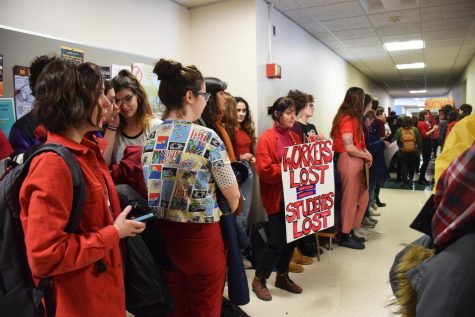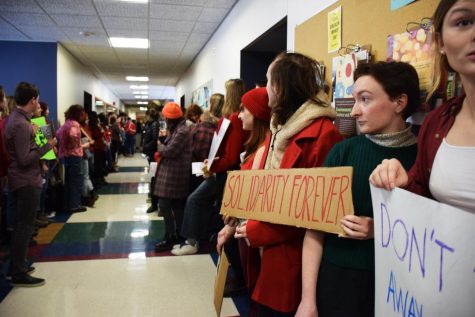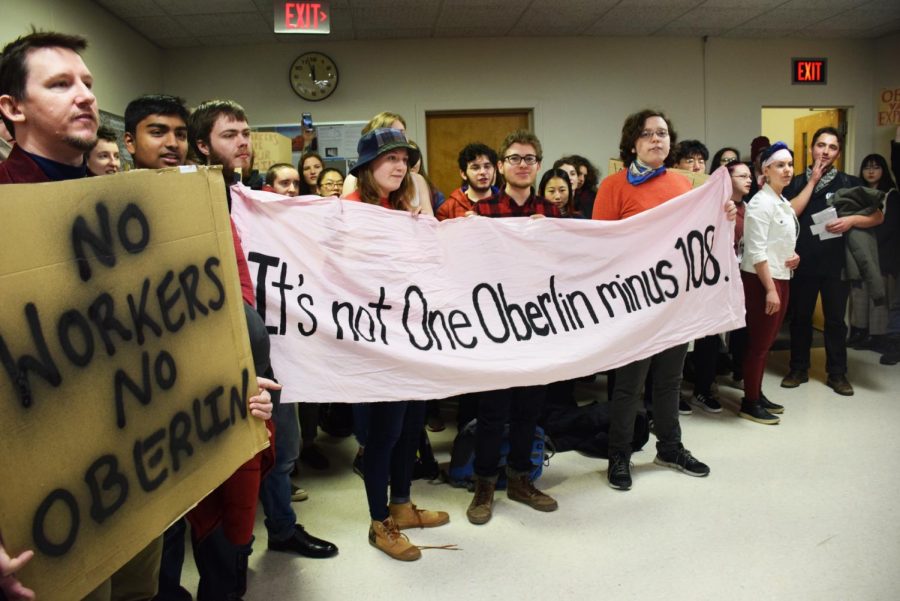College “Considering” Outsourcing Dining, Custodial Services
Hundreds of students protested President Carmen Twillie Ambar’s recent announcement that the College is “formally considering” contracting with outside vendors, potentially cutting 108 United Automobile Workers union jobs, in the King Building Wednesday.
Employees in Oberlin’s chapter of the United Automobile Workers union are reeling after a Tuesday afternoon email from President Carmen Twillie Ambar to the campus community announced that the College is “formally considering” contracting with outside vendors to provide campus custodial and dining services. If the College ultimately chooses to outsource, more than 100 union employees could lose their jobs on June 30, when the transition would occur.
According to President Ambar’s email, Oberlin currently employs 56 custodial and 52 dining staff; both groups combined represent nearly 70 percent of UAW’s campus workforce. Outsourcing those jobs to outside vendors, rather than directly employing dining and custodial workers, would save the College upwards of $2 million annually, according to President Ambar’s message.
The announcement comes as Oberlin’s administration seeks to respond to a mounting structural budget deficit. According to senior administrators, the College needs to cut $17.3 million from its operating budget by 2025. Currently, 63 percent of the annual operating budget is spent on compensation for all employee groups on campus.
While Vice President for Finance and Administration Rebecca Vazquez-Skillings said that it’s not guaranteed that all 108 custodial and dining staff will lose their jobs, she did add that the College is prepared to negotiate the terms of UAW workers ending their employment at Oberlin.
“Those would be terms that we would need to negotiate with the union,” Vazquez-Skillings said. “It could include things such as providing support with résumé building, identification of potential employment, preparation for interviews … as well as an actual severance amount.”
For Erik Villar, chair of the Oberlin College UAW chapter, President Ambar’s announcement came as a surprise.

Students wore red to show support for UAW members.
“It was just shocking,” Villar said, adding that he learned of the College’s proposal about three hours before President Ambar’s message was sent out. “Especially knowing how the union here has worked with the College in good faith to bargain [in the past].”
UAW member Lisa LaRizza, who works in food service maintenance, shared similar sentiments.
“I left a job — I managed a restaurant for 23 years — to come [to Oberlin] because of the promises for my daughter, and insurance, and retirement, and everything that sounded so good at the time,” LaRizza said. “[The announcement] kind of knocked the wind out of me.”
President Ambar’s email referenced the financial “levers” identified in the One Oberlin report as potential areas to realize institutional savings. Those levers include changes to employee compensation; the College’s financial relationship to the Oberlin Student Cooperative Association; and the financial relationship between the College of Arts and Sciences and the Conservatory. The report was released last spring by the Steering Committee of the Academic and Administrative Program Review, endorsed by the General Faculty shortly thereafter, and approved by the Board of Trustees on June 7, 2019.
The portion of the report concerning employee compensation specifically mentioned potential changes to “the tasks which can be contracted through outside vendors.”
While the One Oberlin report recommended different levers to achieve financial stability for the institution, the decision of which levers to pull — and how hard to pull them — ultimately lies with President Ambar’s senior administration, according to Vazquez-Skillings, meaning that multiple paths toward balancing the budget are possible.
“We could’ve pulled harder on all of these other levers,” Vazquez-Skillings said. “We could have decided that we weren’t going to increase student aid, [for example]. Those were not tradeoffs that we thought were tenable.
Vazquez-Skillings also confirmed that there are no current plans for discussions regarding outsourcing to take place with Oberlin College Office and Professional Employees, the Safety union, or the members of UAW not directly impacted by this week’s proposal.
“Shared Sacrifice”
Throughout the announcement of the outsourcing proposal, senior administrators have maintained that all campus groups have been impacted by recent budget cuts.
“Our approach has involved a combination of academic investments and shared sacrifice from people associated with Oberlin to help us focus and strengthen our mission,” Vazquez-Skillings said. “Examples of these sacrifices include a freeze on faculty wages, benefits reductions, reorganizations within the academic ranks and administrative departments, and more.”
President Ambar acknowledged that employee groups will experience the impacts of financial downsizing differently.
“It’s not that the sacrifice will be equal across every group,” President Ambar said. “I think the way to think about it is: What are the priorities that most serve the mission? And that’s where you try to spend your resources.”
Julie Weir, OC ’86, the references and academic commons assistant at Mary Church Terrell Main Library who also serves as president of OCOPE, says that cuts to compensation for union employees have been undertaken without sufficient input. She added her belief that union employees fill a more important role on campus than administrators acknowledge, and are being asked to shoulder a disproportionate financial burden.
“The administration made it clear going into the AAPR process that they had no interest in listening or talking to the unionized members of the community,” Weir wrote in an email to the Review. “They made little effort to discover the many ways these employees contribute to student success or to make accurate comparisons when costing out union jobs. They made it clear in the report that they see these groups as expendable and intend to make the lowest paid bear a huge cost going forward.”
The One Oberlin report analyzed the compensation of Oberlin’s employee groups as compared to peer employee groups, either regionally or across higher education. The report claimed that College faculty are paid 11 percent less and hourly workers are paid 34 percent more than their respective peer groups. These figures are part of the motivation for reducing union compensation, although union members have in the past called into question the validity of the data used to calculate the hourly worker comparison, claiming — as Weir did — that positions at Oberlin were not compared to equivalent positions at other employers.
Villar said that he recognizes the need to make cuts to employee compensation across the board, and had been prepared to approach the bargaining process with the College with that reality in mind.
“I understand the business aspect of things,” Villar said. “I understand there are certain [places] where you’re going to have to make cuts and those decisions are going to have to be made. But I would have expected that those decisions and those outcomes would have been presented to us and we would have had an opportunity to at least go back and forth and see where we can help out.”
Current UAW Contract
The current contract between the College and UAW went into effect Oct. 1, 2017 and is set to expire Sept. 30 of this year. According to Article 2.2 of the contract, the College is able to work with outside vendors under circumstances it deems appropriate. The proposed outsourcing transition would take place June 30, three months prior to the expiration of the current contract.
Vazquez-Skillings says the College has historically utilized this ability.
“We do work with outside vendors,” Vazquez-Skillings said. “If we’re working on a capital project, for example, or if there are maintenance projects that our in-house team is not able to take on, we might subcontract those as well.”
Community Reaction
At 7:30 a.m. Wednesday morning, more than 60 students — most clad in UAW red — gathered alongside UAW employees in the Austin E. Knowlton Athletics Complex to hear Vazquez-Skillings explain the College’s proposed decision. Vice President and Dean of Students Meredith Raimondo was also in attendance, although she did not address the crowd.
The meeting was contentious, with many gathered employees discussing the uncertainty and anxiety created by President Ambar’s announcement. Students applauded several statements, including those that expressed frustration over a lack of communication from senior administrators and highlighted the management experience among current UAW employees.

Students assembled at King Building Wednesday.
Around 11:45 a.m. the same day, more than 600 Oberlin students — student organizers estimated more than 800 — filled the hallways of King Building to demonstrate outside of the regular General Faculty meeting. They held pro-UAW signs and chanted slogans like “Hey-hey, ho-ho, austerity has got to go,” and “union busting is disgusting.”
College fourth-year and Student Labor Action Coalition Chair Elsa Schlensker felt that the demonstration went well.
“A lot of people organizing the action were fourth-years, people who have been around [campus] organizing spaces for a long time,” Schlensker said. “We wanted to create dialogue between students and workers in ways that [haven’t] existed here ever before, and I really saw that during the planning.”
GF meetings are typically closed to non-members, but Schlensker was allowed to attend along with Villar and UAW member Buffy Lukachko. Normally, the only students in the room are representatives from Student Senate and the Conservatory Council of Students.
“We wanted to have UAW reps in the room to hear the remarks that President Ambar had to say, and to have a chance to respond in front of faculty, and to respond to [President] Ambar directly,” Schlensker said.
Some faculty have already expressed discontent with the administration’s proposal.
“I think it’s shortsighted and callous,” said James Monroe Professor of Politics Chris Howell, an expert in trade union history. “If you have employees who are inevitably going to be paid substantially less, [they] are going to be less invested in the jobs.”
Additionally, alumni have begun to circulate an online petition calling for the administration to reverse their position.
“We stand with UAW Local 2192 and will withhold our financial support from the College until this decision is reconsidered,” the petition, which has already been signed by more than 1,000 alumni, states.
Union Busting?
A core area of disagreement between union supporters and administrators is whether the College’s recommended pathway constitutes an act of union busting. Many signs and chants put together by student protestors used the term, and Villar agreed that the College’s actions would serve to “diminish” the UAW’s on-campus body.
“Union busting is antithetical to Oberlin’s values,” said College fourth-year Matt Kinsella-Walsh in a student-written press release circulated Wednesday evening. “Willingly impoverishing over a hundred longtime employees and their families means that, at the end of the day, the values we claim to stand for are hollow.”
Howell largely agreed that the College’s recommendation would, in practice, lead to union busting. He also added that, in his view, the College could have taken a different approach to the conversation about reducing employee compensation.
“If the announcement yesterday had been, ‘The College needs to save $2 million in its contract with the UAW and it proposes to begin an extended period of negotiations in order to see whether $2 million [in savings] can be achieved,’ that would not be union busting,” Howell said. “If the College’s announcement is: ‘We intend to remove 70 percent of the membership of the UAW chapter from that chapter, that we are going to outsource those jobs so they will no longer be part of the UAW, … I think that comes pretty close to union busting.”
President Ambar disagreed, saying that the decision is not meant to directly target union workers.
“I reject that characterization, because this has nothing to do with eliminating the unions,” President Ambar said. “We’ll still have unionized employees here; we’ll still have UAW employees here. It is also possible that potential vendors would employ a unionized workforce.”
New Vendors
The nature of President Ambar’s announcement left UAW workers and other community members unclear about the finality of the College’s proposal to outsource dining and custodial services.
“In my mind, it’s kind of been set in stone,” Villar said, referencing the meeting at which he had initially learned of the proposed plan, hours before it was announced to the campus community. “When we were presented with the information, at first it was told to us that [the College] will no longer be needing these services.”
Villar said that the message Vazquez-Skillings shared with UAW workers in the Wednesday morning forum was different from the information he received in the more private meeting Tuesday morning.
“When she got to Knowlton [she] said something different, that they’re willing to work [with the union],” Villar said. “It was just kind of contradictory … so there’s been confused messages with certain members.”
In an interview with the Review, Vazquez-Skillings said that the College has not predetermined an outcome to the upcoming bargaining process. Similarly, during the gathering at Knowlton, she said that the College has not yet selected vendors.
Villar, Howell, and others are concerned that potential outside vendors would not offer sufficient wages and other benefits to incentivize a stable workforce.
“I feel that bringing in somebody at $12 or $13 an hour, you’re not going to get that same safety [and] comfort of seeing the same person every single day,” Villar said. “The turnaround rate that you’re going to have over time – it’s just going to be astronomical.”
Howell agreed, saying that, in his view, outsourcing would result in much higher rates of staff turnover. He also expressed concerns, shared by other community members, that working with outside vendors could potentially pose a safety risk to students.
“I’m not alarmist by nature, but are we going to be giving key cards to offices and dorm rooms to people who we don’t employ?” Howell said, adding that it was “inconceivable” in his mind that the College would locate vendors to produce sufficiently high-quality services.
For LaRizza, the management experience of any potential vendor is a concern.
“These people that they’re going to hire [won’t have] as much experience [as] I have or expertise that most people have,” LaRizza said.
Vazquez-Skillings said that quality will remain a priority for the institution moving forward.
“We are very early in this process, with many options available to us,” Vazquez-Skillings wrote in an email to the Review. “What is established is our commitment to secure quality services that will allow Oberlin to focus its efforts and resources on the parts of our core mission that we are uniquely qualified to offer. This is an important moment for the institution, and we will proceed down the path that best serves that mission, now and for generations to come.”
On Wednesday morning in Knowlton, Vazquez-Skillings repeated President Ambar’s statement that any potential vendors could also employ a unionized workforce; her statement was met with laughter from the assembled crowd of UAW workers and student supporters.
Next Steps
According to Vazquez-Skillings, regardless of what happens next, the upcoming negotiations between the College and UAW will be the most significant in recent memory.
“This may be the first time in recent history we enter into union negotiations specifically regarding terms that will produce this level of savings,” Vazquez-Skillings said. “Certainly, every three years, we are entering into negotiations with the union. … We’ve had prior negotiations regarding terms with financial impact, but nothing at this level in recent history.”
President Ambar added that it’s possible that employees who lose their Oberlin jobs as a result of outsourcing could find employment with new campus vendors.
“We hope that the potential vendors will take seriously the applications from our employees, and we hope that many, many people will have an opportunity through our vendors [to] still be a part of our Oberlin family,” President Ambar said. However, neither President Ambar nor Vazquez-Skillings were able to guarantee that current UAW workers would be given the opportunity to work with new vendors.
Villar wants to see the College demonstrate more loyalty to its employees.
“A majority of our members … have had generations of family members work here,” Villar said, according to the Wednesday evening press release. “To be told out of the blue on a random Tuesday … that these changes would be implemented in less than four months is a slap in our face to everyone here.”
For LaRizza and others, the anxiety caused by President Ambar’s announcement is here to stay.
“It’s just going to be really hard to get through the rest of the year … just to know that the horrible outcome [is coming] at the end,” LaRizza said. “It’s going to be tough for everybody.”
For now, Schlensker is hoping the administration will walk back their proposal.
“I think the ultimate goal is that I would like to see senior administration decide not to go through with outsourcing as of right now,” Schlensker said. “They haven’t officially committed.”
At the Wednesday morning meeting, Vazquez-Skillings said that official communication from the College regarding the outsourcing proposal will be quiet for the next few weeks as the College engages in discussions with Villar and other union leadership.







